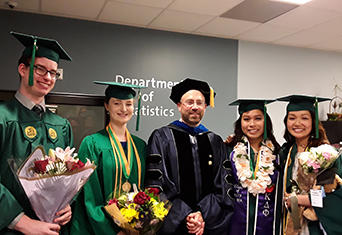"Statistics and mathematics are super important in our everyday lives whether we are checking weather predictions or counting down the days until the next 'Game of Thrones' episode. Statistics is so interesting to me because you can create so many stories out of data."
Learn about the World of Diversified Data
Our Bachelor of Science in statistics program empowers you to analyze data (including big data), design experiments, and use statistical and data science (SDS) techniques to work in areas as diverse as business, finance, pharmaceuticals, government, health care, and wherever the evidence-based decision making is essential. Mason Statistics will train you to gain the knowledge and skills most needed by today’s employers.

in statistics from the Department of Statistics in the spring
of 2019. Pictured from left to right: Dillon Weier, Chris Vaseghi,
university professor William F. Rosenberger, Tammy Bui and Nhi Ngo.
The Bachelor of Science in Statistics is designed to provide a framework for students to develop connections between statistical concepts and theories, their impact to data science, and applications to statistical practice. It will prepare statisticians to use modern statistical techniques to design studies, collect data, analyze and visualize high dimensional data sets, and draw valid conclusions in an increasingly data-centric world. In this program, students will meld the time-tested concepts and theories of statistics with modern methods of analysis, in order to interpret the data that is collected in nearly every discipline and every sector of industry and government. Check the catalog for official degree information.
Graduates of this program can look forward to careers in local, state, and federal government and in the many industries that conduct scientific research, collect, and analyze data, or where data science is essential. They will enter the workforce with the ability to impact science, public policy, technology, and industry in a positive way through their expertise in data collection, analysis, synthesis, and interpretation, each with the highest ethical standards. Graduates will also be prepared to continue their studies in graduate school.
We offer four concentrations in our undergraduate program:
- Statistical analytics, which blends the disciplines of computer science and statistics, as two core disciplines of data science, in a modern way and is designed for students interested in applying concepts from statistics and computer science to the analysis of complex data sets.
- Applied statistics, which focuses on developing proficiency in analytical methods applicable to a specific discipline of the student’s choosing. This is accomplished through the requirement to complete a minor in a field that makes substantial use of data analysis.
- Mathematical statistics: This concentration is designed for students interested in mastering the theoretical underpinnings of statistics and probability; this concentration is recommended for students who intend to continue graduate studies in statistics or whose main focus is on research.
- Sports analytics: This concentration is designed to provide students with an understanding of the principles of research methodology, economics, statistics, and data analytics integral to the growing field of sports analytics. This concentration will prepare students to work with sports teams as well as companies related to the field of sports such as advertisers, sponsors, etc. where data skills are crucial for today’s workforce.
Undergraduate students in our program are required to complete a senior capstone project. They work in teams to address research questions. These projects help students develop an understanding of research methodology and promote critical and innovative thinking.
For more information, email statug@gmu.edu.
Statistics, BS Accelerated Statistical Science MS
Highly qualified students in certain BS programs, including any of the College of Engineering and Computing majors, have the option of obtaining an accelerated statistical science, MS. Students in an accelerated degree program must fulfill all university requirements for the master's degree.
Minor in Statistics or Data Analysis
The Statistics Minor provides students with a background in the methodology and application of statistics. It is intended to complement undergraduate degree programs in the College of Engineering and Computing and the College of Science, especially those programs that require MATH 113 Analytic Geometry and Calculus I, MATH 114 Analytic Geometry and Calculus II, and STAT 344 Probability and Statistics for Engineers and Scientists I as a part of the major requirements.
The minor in data analysis gives students a background in data analysis and statistical methodology. It is intended to complement undergraduate degree programs in Mason Engineering and the College of Science, especially computer science, economics, environmental engineering, geography, mathematics, nursing, psychology, public administration, sociology, and systems engineering.
For more information or to declare minor in either, contact minor coordinator Kenneth Strazzeri.
Statistics PEO
Mission Statement: The undergraduate program in Statistics is designed to produce graduates capable of combining the basic principles of statistics with modern statistical and data science techniques to evidence-based decision making. Graduates should be able to formulate sound statistical questions, identify appropriate statistical approaches, collect and analyze data, and communicate the results of their findings to both technical and lay audiences. Graduates from the BS in Statistics program will demonstrate competence in statistical, computational, and nonmathematical skills as specified in the American Statistical Association Curriculum Guidelines for Undergraduate Programs in Statistical Science.
- Analyze and interpret data by appropriately fitting, assessing, and interpreting a variety of statistical models.
- Summarize data through data reduction and visualization techniques.
- Demonstrate their knowledge of foundational mathematical skills needed for statistics.
- Demonstrate competence using higher-level programming languages, such as R, SAS, or Python, for data analysis.
- Prepare and communicate oral and written statistical reports for a variety of audiences, both as an individual and as part of a team.
Please check out the PEO for 2023 here.
Admission Requirements
Follow the guidelines listed in the catalog for admission to the BS statistics program.
